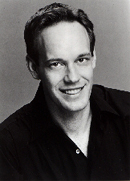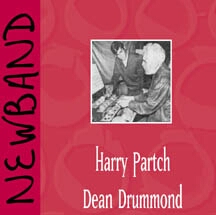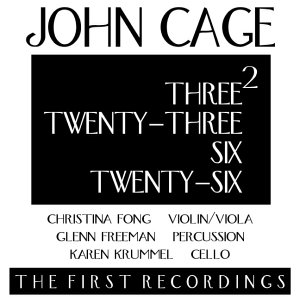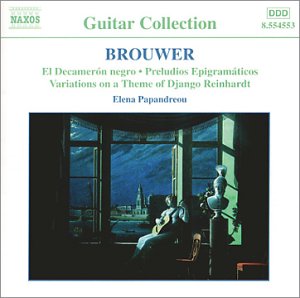 |
|
 |
|
| About Us | Essential Library | Read Past Issues | Resources | Composer Links |
|
RELÂCHE
MEETS
WILLIAM DUCKWORTH AND THE WORLD
|
TRANS-PENNSYLVANIA COMMISSIONS: "Three new works by Sofia Gubaidulina, Oliver Knussen and Roberto Sierra will be commissioned and premiered by the Philadelphia Orchestra and Pittsburgh Symphony under the terms of a new commissioning project to be announced today. All three works will be performed by both orchestras, with one orchestra giving the world premiere of each, and the other holding the right to take that piece to Carnegie Hall for its New York premiere." Philadelphia Inquirer 03/28/02 BOULEZ COMING FULL CIRCLE? Over the decades, composer/conductor Pierre Boulez, who made his reputation attacking the conventions of the art music world, has softened his approach to music and his treatment of those who write and perform it, and in the process, has become one of the world's most beloved authorities on new music. The Lucerne Festival has now announced that Boulez will head up a new contemporary music academy, under the auspices of the festival, beginning in 2004. The academy will focus on teaching young musicians how to appreciate contemporary music as they do Beethoven and Bruckner. Andante 03/28/02 STREET NOISE (OR BEAUTIFUL MUSIC?): Since the mid-1980s, members of the Chicago City Council have been "waging war" on street musicians, "pushing for increasingly restrictive rules governing their behavior and branding them 'unhealthful,' 'safety hazards' and 'peddlers'." Now the city's reversed itself, putting up $1.5 million to encourage street music in a program called Music Everywhere across the Midwest. The idea is that from May 30 to Sept. 29 "the city will be awash in accordionists, organ grinders, kazoos, harmonicas and 'little bongos' that will be handed out - free of charge! - to pedestrians" along with invitations to play on the streets. Chicago Tribune 03/29/02 WHAT AILS YOU: Everyone seems to agree that the music business is suffering. How did business get so bad? "The problems began with the mega-mergers of the '90s, some say. Increasingly large corporations have lost touch with consumers, they claim, alienated artists and failed to incorporate emergent technology by fighting the Napster music downloading system instead of making a deal early on. Performers, in turn, are arguing for improved conditions, including ownership of their work. They want to be free agents, like actors, who are not beholden to long-term contracts with one studio." Miami Herald 03/24/02 CONCERT HALL DOCTOR: Acoustician Russell Johnson has designed the sound for many successful concert halls around the world - he's one of the best in the profession. So why, given the sorry state of acoustics in London's concert spaces, has no one signed up Johnson to make things better? London Evening Standard 03/27/02 MUSIC'S VOODOO ECONOMICS: Recording company EMI recently announced it is cutting 1800 jobs and a quarter of its artists. "Some interesting facts have emerged: record sales are falling internationally (down almost 10 per cent in the US); only five per cent of major label releases make a profit, and big record companies need to sell 500,000 copies of a CD just to break even." But "undeterred by paying Mariah Carey £38 million to end her contract (and dropping hundreds of other artists) they have just offered Robbie Williams £40 million to extend his." The Telegraph (UK) 03/28/02 TOWARDS YOUNGER POORER AUDIENCES: Trying to fight off charges of elitism, London's Royal Opera House has released a study that says its patrons are getting younger and poorer (really). The study shows that "one fifth of opera goers were under 35 years old - and a similar proportion earn less than £15,000 per year. And more than half of opera goers have an income less than £30,000. BBC 03/28/02 SLATKIN
WILL DROP BBC GIG: "National Symphony Orchestra Music Director Leonard
Slatkin will step down from his "other" job - that of chief conductor of
the BBC Symphony Orchestra - in September 2004. He has held the position
since 2000. Slatkin recently extended his contract with the NSO through
the end of the 2005-2006 season. His initial contract with the BBC was
set to run through 2003; in renewing for one additional season, he made
it clear that 2004 would be his last year." Washington Post 03/26/02
|
An Interview with Gloria Coates
In 1986, Coates was one of the 10 finalists for the International Koussevitsky (KIRA) Award which honors a living composer for an important work for her composition "Music on Open Strings." She has been the recipient of numerous awards, commissions and distinctions. Coates' music has been performed by leading soloists, ensembles and orchestras such as the Bavarian Radio Symphony Orchestra, Brooklyn Philharmonic, Stuttgart Philharmonic, Milwaukee Symphony, Saint Paul Chamber Orchestra, the London Sinfonia, Polish Chamber Orchestra, various international chamber ensembles including Das Neue Werk Hamburg, the Dresden Ensemble for New Music and the Kronos Quartet. Her work Music on Open Strings, written in1973 for orchestra, was premiered at the Warsaw Autumn of 1978 and proved to be the most widely discussed work on the Festival. In 1979 she was commissioned to write a work for the East Berlin Festival, the first non-socialist composer ever to be performed on it. Some other Festivals include the Dresden Festival, New Music America - New York 1989, Musica Viva Munich, The New York Microtonal Festival, Henze's Festival Montepulciano, Passau International Festival, and the Dartington Festival in England. From 1969 to 1989, Coates lived in Europe where hers was a powerful voice on behalf of American music. She has lectured, written musicological articles, produced and broadcast radio programs, and organized a concert series of German-American music in Munich from 1975 - 1984. Since 1989 Gloria Coates has divided her time between the United States and Europe. In addition to her composition, she is a trained painter and the CD covers featured in this article are photos of her work. Coates'
canon of work includes compositions for orchestra (13 symphonies), chamber
(7 string quartets) and solo music, vocal (a song cycle on poems by Emily
Dickinson), choral music, live electronic and music for the theater. Her
string quartets 1, 5 and 6 have just been released on Naxos CD.
S21: You are best-known for your symphonies. How do you decide what constitutes a symphony? What elements must a work contain to be a symphony rather than, say, an Essay as Barber sometimes called his pieces)? Does your definition somehow relate to Mahler's idea that a symphony is a work that contains everything it takes to make a "world?" GC: It was never an intention of mine to write a symphony, although since 1973 I had written quite a number of orchestral works with three or four movements, always changing the titles and never being satisfied. Sometimes they would be related to the structures such as "Music on Open Strings" and sometimes to the emotional content such as "Illumination in Tenebris." Finally in 1990, all titles seemed totally unfitting to a new orchestral work which lasted a half hour and had 52 instruments playing simultaneously. This was a very serious work and had used various structures that I had developed over many years in a new way, and it seemed heavier in comparison to my other compositions.
Classical Grammy Winners
 |

Dead Man Walking Composer: Jake Heggie Conductor: Patrick Summers Performer: Susan Graham, Frederica von Stade Ensemble: San Francisco Opera Chorus and Orchestra Wea/Atlantic/Erato - #86238 No "Nixon in China" or "Einstein at the Beach" but young Heggie has a way with melody and this debut opera suggests there may be better things to come. |
A Prole do Bebe No. 2, Cirandinhas Composer: Heitor Villa-Lobos Performer: Sonia Rubinsky Naxos - Flat out fantastic. Rubinsky makes child's play of Villa-Lobos' thornier conceits. If you live in New York, write this down: Sonia Rubinsky will be performing selections from Vol. 2 and the upcoming Villa-Lobos: Piano Music Vol. 3 on March 14th, Thursday, at 6:30 pm at the Klavier-Haus located at 211 West 58th St. |
Music for the Movies Alfred SCHNITTKE (1934-1998) Composer: Alfred Schnittke Conductor: Frank Strobel Ensemble: Rundfunk-Sinfonieorchester Berlin, Rundfunkchor Berlin Cpo Records Schnittke regarded film music as a legitimate expressive medium and wrote more than sixty film scores and worked with the prominent directors of his day. This collection demonstrates that he understood film composition thoroughly and considered it a new vista for his creative work. |

NEWBAND Composers: Harry Partch, Dean Drummond Innova 561 Works by former cohorts and microtonal pioneers, Harry Partch and Dean Drummond. This stunning new recording is performed by members of Newband primarily on the original Partch collection of hand-made instruments, notable for their sculptural and acoustic beauty. The music integrates declaimed poetry (masterfully performed by Bob Osborne) with colorful instrumental accompaniment. The Drummond pieces are first recordings, the Partch are the first since the 1940s. |
|
Preludes & Fugues for 13 solo strings: Three Postludes; Fanfares Composer: Witold Lutoslawski Conductor: Antoni Wit Naxos - #8555270 A treasure trove of Lutoslawski's "little" works, with lots of delightful listening for even those not fully committed to 20th century work. |
Passacaglia, Symphony, Five Pieces Passacaglia, Symphony, Five Pieces Composer: Anton Webern Conductor: Takuo Yuasa Ensemble: Ulster Orchestra Naxos Who knew that the Second Viennese School could be so...listenable. Has the music changed or have our ears adapted to the atonality? |
Concerto for Strings Composer: Joly BRAGA SANTOS Performer(s): Braga Santos, Creswick, Somov, Blair, Cassuto Marco Polo - Joly Braga Santos is one of the most interesting and gifted composers of the 20th century--and one of the most unknown. His musical language is based on a strong sense of architecture and drama, with generous melodic lines and a natural instinct for structure and formal coherence. If you don't know the work of this 20th century Portugese master, grab it. |
Symphony No. 1 Composer: George Barati Conductor: Laslzo Kovaks, Vladimir Valek Ensemble: Budapest Symphony Orchestra, Czech Radio Symphony Orchestra Naxos - The First Symphony was written in 1963 during a stay in Switzerland. Set in three movements, it is packed with musical incident. The Chant of Darkness was composed in 1993 as an expression of the composer’s grief as his daughter lay dying from cancer. The work exhibits a frightening sense of finality. The Chant of Light dates from 1994-5 and is cast in a simple structure, displaying Barati’s love of working with small motivic cells, combined with the use of luscious orchestral color. |

90% Post Consumer Sound Composer: Ellen Band Performer: Adele Armin Ellen Band Band creates 'sound art' from everyday noises with results that sometimes sound celestially musical and sometimes sound like..well everyday noises. |

Three2, Twenty-Three, Six, Twenty-Six Composer: John Cage Performer: Christina Fong, Glenn Freeman, et al. Orchard - #6260 |
String Quartets 1 & 2 Composer: Arnold Bax Performer: Maggini Quartet Naxos - Fresh from the Gramophone Award-winning Naxos recording of Vaughn Williams, the Maggini turn their attention to another English composer of elegiac melodies with superb results. |

Guitar Music, Vol. 2 Composer: Leo Brouwer Performer: Elena Papandreou Naxos - One of the best writers for the guitar alive today, Brouwer combines elements of his native Cuba with jazz and European modernism. Papandreou performs these tricky pieces elegantly. |
|
One-Minute Web Guide The essential guide to intelligent life on the internet |
Publisher: Duane Harper Grant (212) 582-4153 Editor: Jerry Bowles (212) 582-3791 Contributing Editors: Armando Bayolo, Sam Bergman, Joshua Cohen, Karina Cristina Demitrio, Deborah Kravetz (C) Sequenza/21 LLC 2000 |